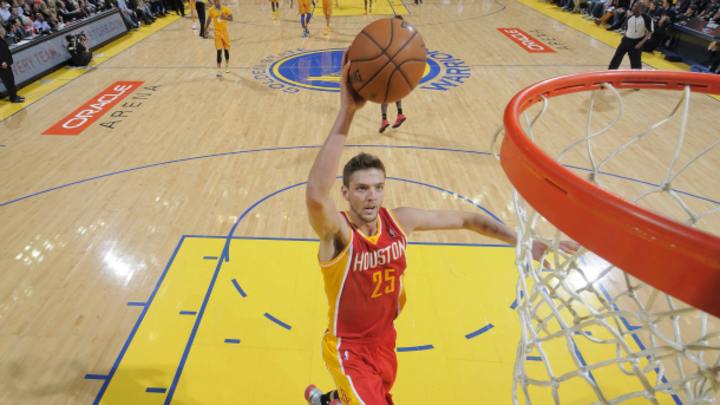Three-Pointers: Rockets eke out odd victory over slumping Warriors

Chandler Parsons was one of the few bright spots for Houston's uncharacteristically inefficient offense. (Rocky Widner/NBAE via Getty Images)
By Rob Mahoney
The matchups between the Rockets and Warriors this season had typically yielded some high-scoring fireworks, but on Friday the two potent offenses conspired to play a very different game. Neither team played their best basketball; scoring lulls were endured, the decision-making on both sides was questionable and the momentum of the game was interrupted with twists and turns. Yet both teams played to a tight margin through the final minute, and Houston was ultimately able to sneak away with a weird, inefficient 94-88 victory.
• James Harden (3-17 FG, three turnovers) had one of his worst scoring performances of the season and somehow still wound up with 20 points on the night. Credit the Warriors' occasional impatience; Harden is one of the best in the league when it comes to drawing contact, but he toyed with Golden State's perimeter defenders and earned 14 free throw attempts (eight of which came in the fourth quarter) to counter a miserable shooting night. Those same defenders did a decent job of bothering Harden's other shot attempts, but for the most part Houston's explosive lead guard simply whiffed on typical, makeable shots. He missed a handful of quality three-point looks, botched a few clean looks at the rim, and played for contact on some drives at the expense of his actual shot attempts.
These things happen, even to a scoring wizard like Harden*. But the void created by Harden's struggles needed to be filled lest Houston fall into an all-too-familiar rut, and Chandler Parsons (26 points, 9-13 FG, 6-8 3FG) was more than happy to oblige. Parsons began the evening with pinpoint accuracy from beyond the arc, and built a terrific scoring performance out from the threat of his long-range shooting. Once Parsons' first few three-pointers fell, the Warriors began to bite hard on every shot fake, thus affording Parsons the opportunity to put the ball on the floor and challenge the rotational integrity of Golden State's defense. He didn't exactly destroy the Warriors off the bounce, but those opportunities generated points for Parsons off mid-range looks and created a point of leverage for the Rockets' half-court offense.
*To be fair, Harden (11 assists) did an outstanding job of manufacturing open looks for his teammates once his own shot began to betray him. Even an off night wouldn't deter Harden from driving into the teeth of the defense, from which he was able to set up Parsons and Carlos Delfino for wide open shots in the corners. The Rockets' offense obviously clicks on a different level when Harden is connecting on his jumper more consistently, but falling back on Harden as an off-the-dribble playmaker pans out as a fine contingency.
• It was a bit shocking, to say the least, to see two offense-first teams grinding out possessions to little effect. Houston ultimately won the day by scoring at a rate of 97.9 points per 100 possessions -- a few shades worse than the league-worst efficiency of the Washington Wizards, and roughly 13 points worse than their own season average. Golden State, needless to say, wound up scoring at an even lesser rate, largely due to the struggles of every rotation player outside the Curry-Thompson-Lee triumvirate. The shooting on both sides was roundly underwhelming, in part because neither squad was particularly crisp in its execution. The Rockets, to their great fortune, worked out many of the kinks in their offense early -- or at least enough of them to coast in the final minutes on free throw attempts alone. The Warriors, on the other hand, found all kinds of creative ways to sabotage their own possessions, culminating in David Lee misfiring on an outlet pass with 10 seconds remaining. These were some truly ugly performances from two teams that regularly pile up points and execute well, but the dog days of March spare none.
• Mark Jackson and Kevin McHale aren't necessarily master strategists, but it was fun to see the tetê-à-tetê in the rotation decisions between the two coaches. In the second half, McHale began to capitalize on the presence of Golden State's Festus Ezeli -- a non-factor on offense -- by switching Omer Asik onto the far more threatening David Lee, who had been giving Houston trouble all night by overpowering smaller defenders from the left block. It was a wise move, and one that paid immediate dividends for the Rockets. But Jackson yanked Ezeli from the game rather quickly and replaced him with Andrew Bogut, a dramatic change. Bogut may not be in peak form, but his size, wealth of moves, and ability to score with both hands would make him a difficult cover for a wing player to guard in a cross-match situation. McHale, who had been riding a small lineup with Carlos Delfino as his nominal 4, opted to switch Asik off of Lee once again as to not give up too much of an advantage to Bogut.

Rob Mahoney is an NBA writer dedicated to the minutiae of the game of basketball, its overarching themes and everything in between. He joined the Sports Illustrated staff in 2012.